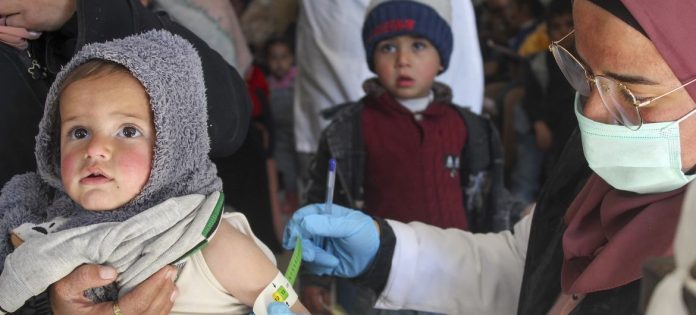The increasing number of respiratory illnesses in northwest Syria is being worsened by factors such as inadequate heating, overcrowded camps, and damaged infrastructure.
The Health Cluster, as reported by ReliefWeb, highlighted a significant rise in influenza-like illnesses and severe acute respiratory infections during the winter, leading to more hospital visits and heightened public health concerns.
Coordinated by WHO, the Health Cluster brings together over 900 partners globally to address health needs in humanitarian emergencies by providing expertise, capacity-building, and technical guidance for effective responses in crisis-affected regions.
Deteriorating Conditions
The harsh winter conditions in northwest Syria are worsening the health vulnerabilities of internally displaced people, who often live in makeshift shelters and overcrowded camps lacking proper insulation and heating.
Health officials are also warning of increased risks of hypothermia as temperatures drop.
To tackle these challenges, health partners stress the necessity of targeted interventions like better insulated shelters, heating resources, and access to essential medical supplies.
Humanitarian Response
The UN and its partners are intensifying efforts to improve healthcare access in the region.
Recently, 750 trucks carrying aid from seven UN agencies, including WHO and the UN Children’s Fund (UNICEF), entered northwest Syria through the Bab Al-Hawa and Bab Al-Salam crossings, with 37 trucks arriving this week.
These shipments contain crucial medical supplies, food, and other humanitarian aid.
WHO has provided support to 37 health facilities and 14 health cluster partners with trauma supply kits, benefiting over 90,000 individuals.
The UN Population Fund (UNFPA) has also delivered health kits to enhance sexual and reproductive health services. Mobile mental health units are offering psychological support to vulnerable populations, including children and internally displaced people, in remote areas.
To address critical shortages, health partners like the WATAN foundation have deployed three mobile blood banks, gathering 210 blood units through donation campaigns. Other partners are assisting hospitals in Aleppo, focusing on pediatric care and trauma services.
Ongoing Challenges
Despite these efforts, the health crisis in northwest Syria remains severe.
Recent landmine explosions in Idlib, Aleppo, and Hama have resulted in fatalities and injuries, putting further strain on the health system. On December 24, three explosions caused a fatality in Idlib and injuries in Aleppo, including a child.
Funding shortages are also a major concern.
The Health Cluster needs $22 million over the next three months to maintain essential healthcare services for 450,000 people. Severe underfunding has put 140 health facilities at risk, including general and specialized hospitals, primary health centers, and dialysis units.




